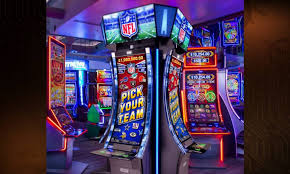
Pakistan is a country known for its rich history, stunning landscapes, and vibrant culture. However, its tourism sector has struggled to reach its full potential due to a range of factors, including safety concerns and limited infrastructure. In recent years, there has been growing interest in the idea of legalizing slot machines and other forms of gambling as a way to boost the country’s tourism industry. But is this a viable solution? Can the legalization of slot machines truly revitalize Pakistan’s tourism and bring economic growth?
In this blog, we’ll explore the potential impact of legalizing slot machines in Pakistan, the benefits and challenges of such a move, and how it could reshape the country’s tourism landscape.
The Current State of Pakistan’s Tourism Industry
Tourism is an important sector for many countries, contributing to job creation, local business growth, and the overall economy. In Pakistan, however, the industry has not been able to flourish as much as it could. Despite having natural wonders such as the Karimabad Hunza Valley, Fairy Meadows, and Swat Valley, as well as historical sites like Mohenjo-daro and Lahore Fort, the country’s tourism sector remains underdeveloped.
Many foreign tourists have been deterred by political instability, security concerns, and limited tourism infrastructure. This has left Pakistan with untapped potential in terms of attracting international visitors. However, one potential solution being considered is the introduction of legalized gambling, specifically slot machines, as a means to attract more tourists and generate additional revenue for the country.
The Role of Slot Machines in Tourism
Slot machines have long been associated with vibrant tourism hubs around the world, particularly in places like Las Vegas, Macau, and Monte Carlo, where gambling is a significant part of the tourism experience. These destinations attract millions of visitors each year who come for both the chance to gamble and the luxury entertainment that surrounds it.
In countries where gambling is legal and well-regulated, tourism industries have thrived. The casino tourism model has proven successful in various parts of the world, combining gambling with other attractions, such as fine dining, high-end hotels, shopping, and entertainment. For Pakistan, legalizing slot machines could potentially create a new industry that not only draws tourists but also provides local employment opportunities, infrastructure improvements, and an increase in foreign exchange earnings.
1. Attracting International Tourists
Legalizing slot machines could position Pakistan as an emerging destination for international tourists seeking both adventure and leisure. Tourists often seek destinations that offer a variety of experiences, and the inclusion of legalized gambling could make Pakistan more competitive with other countries in the region, such as India, Sri Lanka, and Nepal, which already have some form of legal gambling in place.
The introduction of slot machines could appeal to tourists who enjoy the thrill of casinos, creating a niche market for casino tourism. If combined with Pakistan’s rich cultural offerings, nature tourism, and historical landmarks, this could make the country more attractive to a broader range of travelers.
2. Creating Jobs and Boosting the Local Economy
The legalization of slot machines would not only attract tourists but also create job opportunities in the hospitality, entertainment, and gaming industries. From casino staff to security personnel, marketers, and hotel workers, a regulated gambling sector could generate thousands of jobs. Additionally, local businesses could benefit from the increased foot traffic brought by tourists visiting casino resorts, thus contributing to the overall economy.
Moreover, with the right regulations in place, the government could tax the casino industry, generating additional revenue that could be reinvested into other sectors such as infrastructure, health, and education.
3. Developing Modern Tourism Infrastructure
Legalizing slot machines could serve as a catalyst for the development of modern tourism infrastructure. For example, the establishment of high-end casino resorts could lead to the construction of new hotels, restaurants, entertainment venues, and even airports or transportation networks to accommodate increased tourist traffic. These investments in infrastructure could enhance the overall travel experience for visitors, further boosting Pakistan’s appeal as a tourist destination.
The Challenges of Legalizing Slot Machines in Pakistan
While the potential benefits of legalizing slot machines are significant, there are also several challenges that need to be addressed for this move to succeed.
1. Cultural and Religious Barriers
One of the primary hurdles to legalizing gambling in Pakistan is the country’s cultural and religious landscape. Pakistan is a Muslim-majority nation, and Islamic teachings prohibit gambling. This has led to significant resistance from conservative religious groups who view gambling as a moral and ethical issue. Overcoming these cultural and religious barriers would require careful consideration and dialogue with stakeholders to ensure that gambling is introduced in a way that aligns with the country’s values.
2. Regulation and Control
For the legalization of slot machines to be successful, strict regulations would need to be put in place. Without a well-regulated framework, there is a risk of illegal gambling activities emerging, leading to a lack of consumer protection and potential exploitation of vulnerable individuals. The government would need to ensure that any legal gambling establishments are properly licensed, monitored, and held to high standards of fairness and transparency.
3. Gambling Addiction Concerns
The introduction of slot machines would also raise concerns about gambling addiction. While slot machines are popular for their fast-paced, easy-to-play format, they can also be highly addictive. Pakistan would need to invest in education and support services to help individuals struggling with gambling addiction and ensure that casinos and gambling establishments promote responsible gaming practices.
Is Legalizing Slot Machines the Right Move?
Legalizing slot machines could certainly have a positive impact on Pakistan’s tourism industry, but it would require careful planning and regulation to avoid potential pitfalls. To succeed, the government would need to:
- Establish a clear legal framework that governs online and land-based casinos.
- Ensure responsible gambling practices are in place.
- Balance the economic benefits with cultural sensitivities.
If done correctly, legalizing slot machines could revitalize the tourism industry, attract international tourists, create jobs, and boost local economies. However, it is crucial that this move is approached with caution, keeping in mind the broader societal and ethical concerns, as well as ensuring that gambling is properly regulated to protect consumers.
Conclusion
The potential for slot machines to revitalize Pakistan’s tourism sector is there, but the road ahead is filled with challenges. By learning from successful gambling tourism models and carefully navigating cultural, religious, and regulatory concerns, Pakistan could tap into a new and lucrative market. The question remains: will Pakistan’s government take the necessary steps to legalize and regulate slot machines, thus transforming the country’s tourism industry for the better? Only time will tell.
Make Money Online with KKClub.pk – Pakistan’s Premier Online Casino
Are you ready to turn your passion for gaming into real cash? KKClub.pk is here to offer you a thrilling online casino experience that lets you win big from the comfort of your own home. As Pakistan’s trusted online casino, we provide an exciting platform where you can play your favorite casino games and earn real money every day!
Why Choose KKClub.pk to Make Money?
💸 Win Real Cash – At KKClub.pk, every game is an opportunity to win! Whether you’re spinning the reels on slots, taking your chances at the roulette table, or showing off your poker skills, you can earn cash rewards with every win.
🎮 Variety of Games – Our extensive collection of games ensures that there’s something for everyone. From high-stakes poker to classic blackjack, and from exciting video slots to immersive live dealer games, the chance to make money is just a click away.
🎁 Exclusive Bonuses – Start your journey to real cash with a generous welcome bonus, and keep winning with exciting promotions and free spins. The more you play, the more you earn!
📲 Play Anytime, Anywhere – Whether you’re at home or on the go, KKClub.pk’s mobile-friendly platform means you can start making money anytime, anywhere. Play on your smartphone or tablet, and never miss an opportunity to win!
🔐 100% Secure and Fair – We prioritize your safety. Our platform is fully licensed and regulated, and we use advanced encryption to protect your personal and financial information. Play with peace of mind, knowing your winnings are secure.
💰 Quick Withdrawals – When you win, you want to cash out fast! At KKClub.pk, we offer fast and reliable withdrawal options, so you can access your winnings in no time.
🛠️ 24/7 Support – Got a question or need assistance? Our professional support team is available 24/7 to help you with any concerns, so you can focus on making money and enjoying the game.
Join KKClub.pk Today and Start Earning!
Whether you’re looking to relax and have fun, or you’re serious about making money online, KKClub.pk is the place to be. Sign up today, claim your bonus, and start your journey to real cash prizes! With exciting games, incredible bonuses, and a secure platform, KKClub.pk is your gateway to winning big – all from the comfort of your own home.
Play Smart, Win Big, and Make Money with KKClub.pk!


